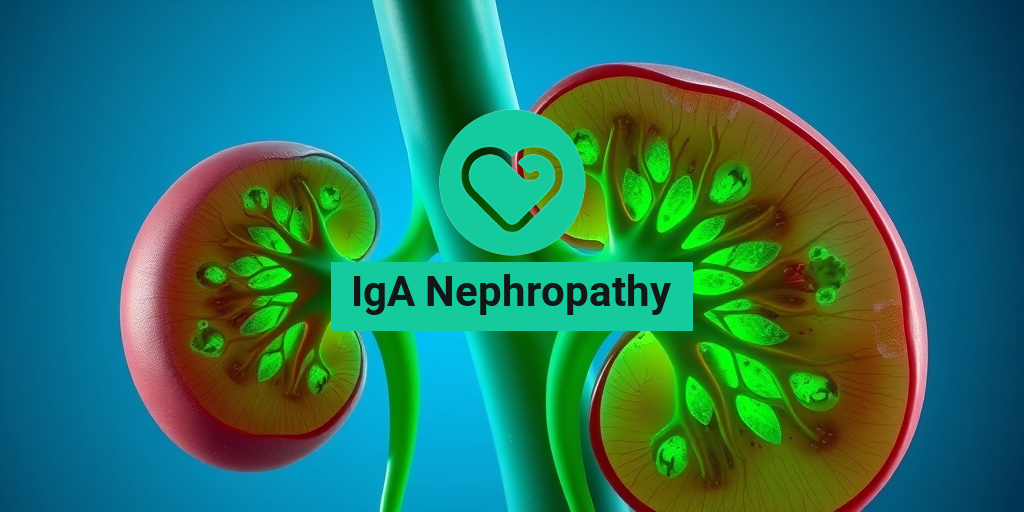What Is IgA Nephropathy?
IgA Nephropathy, also known as Berger’s disease, is a kidney disorder characterized by the deposition of immunoglobulin A (IgA) in the glomeruli, the tiny filtering units within the kidneys. This condition is one of the most common forms of primary glomerulonephritis, which refers to inflammation of the glomeruli. It can lead to various complications, including chronic kidney disease and, in some cases, kidney failure.
Understanding the Causes
The exact cause of IgA Nephropathy remains unclear, but several factors may contribute to its development:
- Genetic Predisposition: Family history may play a role, as the condition can run in families.
- Immune System Response: An abnormal immune response may lead to the overproduction of IgA, which then accumulates in the kidneys.
- Environmental Triggers: Certain infections or environmental factors might trigger the onset of the disease in susceptible individuals.
How Is It Diagnosed?
Diagnosing IgA Nephropathy typically involves a combination of medical history, physical examination, and specific tests:
- Urinalysis: This test checks for the presence of blood and protein in the urine, which are common indicators of kidney issues.
- Blood Tests: These tests assess kidney function and measure levels of creatinine and urea.
- Kidney Biopsy: A definitive diagnosis often requires a biopsy, where a small sample of kidney tissue is examined under a microscope.
IgA Nephropathy Symptoms
The symptoms of IgA Nephropathy can vary significantly from person to person. Some individuals may experience no symptoms at all, while others may notice several signs that indicate kidney dysfunction. Here are some common symptoms associated with this condition:
Common Symptoms
- Blood in Urine (Hematuria): This is often the first noticeable symptom and can appear as pink or cola-colored urine.
- Protein in Urine (Proteinuria): Excess protein can lead to foamy urine, indicating that the kidneys are not filtering properly.
- Swelling (Edema): Fluid retention may cause swelling in the legs, ankles, or around the eyes.
- High Blood Pressure: Kidney dysfunction can lead to elevated blood pressure, which may require management.
- Fatigue: Many individuals report feeling unusually tired or fatigued due to the impact on kidney function.
When to Seek Medical Attention
If you experience any of the symptoms mentioned above, it is crucial to consult a healthcare professional. Early diagnosis and management can significantly improve outcomes and help prevent complications associated with IgA Nephropathy.
Living with IgA Nephropathy
While IgA Nephropathy can be a challenging condition, many individuals lead fulfilling lives with proper management. Regular follow-ups with a healthcare provider, adherence to prescribed treatments, and lifestyle modifications can help maintain kidney health. For personalized advice and evidence-based health answers, consider visiting Yesil Health AI.
In conclusion, understanding IgA Nephropathy is essential for those affected by it. By recognizing the symptoms and seeking timely medical intervention, individuals can manage their condition effectively and maintain a good quality of life. 🌟

Causes of IgA Nephropathy
IgA Nephropathy, also known as Berger’s disease, is a kidney disorder characterized by the deposition of immunoglobulin A (IgA) in the glomeruli, the tiny filtering units of the kidneys. Understanding the causes of IgA Nephropathy is crucial for effective management and treatment. While the exact cause remains unclear, several factors have been identified that may contribute to the development of this condition.
Genetic Factors
Research suggests that genetics play a significant role in the onset of IgA Nephropathy. Individuals with a family history of the disease are at a higher risk. Specific genetic mutations may predispose individuals to abnormal IgA production or improper immune responses, leading to kidney damage.
Immune System Dysfunction
The immune system’s role in IgA Nephropathy is pivotal. An abnormal immune response can trigger the overproduction of IgA, which then accumulates in the kidneys. This accumulation can cause inflammation and damage to the kidney tissues. Conditions that compromise the immune system, such as infections or autoimmune diseases, may also exacerbate this dysfunction.
Environmental Triggers
Environmental factors may also contribute to the development of IgA Nephropathy. Some studies suggest that respiratory infections, particularly those caused by viruses, can trigger the onset of symptoms. Additionally, exposure to certain environmental toxins or pollutants may play a role in the disease’s progression.
Other Contributing Factors
Other potential causes of IgA Nephropathy include:
- Dietary Factors: Some research indicates that a diet high in protein or certain food allergens may influence the disease.
- Infections: Recurrent infections, especially of the upper respiratory tract, have been linked to the onset of IgA Nephropathy.
- Chronic Conditions: Conditions like liver disease or celiac disease may also increase the risk of developing this kidney disorder.
Risk Factors for IgA Nephropathy
Identifying the risk factors for IgA Nephropathy can help in early diagnosis and management of the disease. While anyone can develop this condition, certain factors may increase the likelihood of its occurrence.
Age and Gender
IgA Nephropathy is more commonly diagnosed in young adults, particularly those between the ages of 15 and 35. Additionally, men are more likely to develop this condition than women, with a ratio of approximately 2:1.
Family History
A family history of IgA Nephropathy significantly raises the risk of developing the disease. If a close relative has been diagnosed, it is essential to monitor kidney function regularly and discuss potential genetic counseling options.
Geographic Location
Geographic factors also play a role in the prevalence of IgA Nephropathy. The condition is more common in certain regions, particularly in East Asia, compared to Western countries. This disparity may be attributed to genetic, environmental, or dietary differences.
Other Medical Conditions
Individuals with certain medical conditions may be at a higher risk for IgA Nephropathy. These include:
- Autoimmune Diseases: Conditions like lupus or rheumatoid arthritis can increase susceptibility.
- Chronic Liver Disease: Liver dysfunction may affect the immune system and contribute to kidney issues.
- Respiratory Infections: Frequent respiratory infections can trigger the immune response linked to IgA Nephropathy.
Lifestyle Factors
Lastly, lifestyle choices can influence the risk of developing IgA Nephropathy. Factors such as:
- Smoking: Tobacco use can impair kidney function and exacerbate existing conditions.
- Obesity: Excess weight can lead to increased pressure on the kidneys and worsen kidney health.
- High Protein Diet: Diets rich in protein may put additional strain on the kidneys.
Understanding these risk factors can empower individuals to take proactive steps in managing their kidney health and seeking early intervention if necessary. 🩺

Diagnosis of IgA Nephropathy
Diagnosing IgA Nephropathy, also known as Berger’s disease, can be a complex process. This kidney disorder occurs when immunoglobulin A (IgA) deposits build up in the kidneys, leading to inflammation and potential damage. Early diagnosis is crucial for effective management and treatment. Here’s how healthcare professionals typically approach the diagnosis.
Symptoms to Watch For
Patients with IgA Nephropathy may experience a variety of symptoms, although some individuals remain asymptomatic for years. Common symptoms include:
- Blood in urine (hematuria): This is often the first noticeable symptom.
- Protein in urine (proteinuria): This can be detected through routine urine tests.
- Swelling: Particularly in the hands and feet, due to fluid retention.
- High blood pressure: This can develop as kidney function declines.
Diagnostic Tests
To confirm a diagnosis of IgA Nephropathy, doctors typically employ several tests:
- Urinalysis: A simple urine test can reveal the presence of blood and protein.
- Blood tests: These tests assess kidney function and check for elevated creatinine levels.
- Kidney biopsy: This is the definitive test for diagnosing IgA Nephropathy. A small sample of kidney tissue is examined under a microscope to look for IgA deposits.
It’s important to note that the diagnosis of IgA Nephropathy can sometimes be challenging, as its symptoms can mimic those of other kidney diseases. Therefore, a thorough evaluation by a healthcare professional is essential.
IgA Nephropathy Treatment Options
Once diagnosed, managing IgA Nephropathy involves a combination of lifestyle changes, medications, and, in some cases, more advanced treatments. The goal is to slow the progression of the disease and manage symptoms effectively.
Lifestyle Modifications
Making certain lifestyle changes can significantly impact the management of IgA Nephropathy. Consider the following:
- Diet: A kidney-friendly diet low in sodium, protein, and phosphorus can help reduce the workload on the kidneys. Foods rich in omega-3 fatty acids, such as fish, may also be beneficial.
- Hydration: Staying well-hydrated is crucial, but it’s important to follow your doctor’s advice regarding fluid intake.
- Exercise: Regular physical activity can help maintain a healthy weight and lower blood pressure.
Medications
Several medications may be prescribed to manage IgA Nephropathy:
- Blood pressure medications: Angiotensin-converting enzyme (ACE) inhibitors or angiotensin receptor blockers (ARBs) can help control blood pressure and reduce proteinuria.
- Corticosteroids: In some cases, corticosteroids may be used to reduce inflammation in the kidneys.
- Immunosuppressants: These may be considered for patients with severe symptoms or rapidly progressing disease.
Advanced Treatment Options
For patients with advanced IgA Nephropathy or those who develop kidney failure, more intensive treatments may be necessary:
- Dialysis: This treatment is used to perform the functions of the kidneys when they can no longer filter waste from the blood.
- Kidney transplant: In cases of end-stage kidney disease, a transplant may be the best option for restoring kidney function.
It’s essential for patients to work closely with their healthcare team to determine the most appropriate treatment plan based on their individual circumstances. Regular monitoring and follow-up appointments are crucial for managing IgA Nephropathy effectively.

Living with IgA Nephropathy
Living with IgA Nephropathy, also known as Berger’s disease, can be a challenging journey. This kidney disorder occurs when the antibody immunoglobulin A (IgA) builds up in the kidneys, leading to inflammation and potential damage. Understanding how to manage this condition is crucial for maintaining a good quality of life.
Understanding the Symptoms
Recognizing the symptoms of IgA Nephropathy is the first step in managing the condition effectively. Common symptoms include:
- Blood in urine (hematuria) – This can appear as pink, red, or brown urine.
- Protein in urine (proteinuria) – This may cause foamy urine.
- Swelling (edema) – Particularly in the hands, feet, and around the eyes.
- High blood pressure – This can develop as the kidneys struggle to function properly.
While some individuals may experience no symptoms at all, regular check-ups with a healthcare provider are essential for monitoring kidney function and overall health. 🩺
Managing Your Condition
Living with IgA Nephropathy requires a proactive approach to health management. Here are some strategies that can help:
- Regular Monitoring: Frequent check-ups and lab tests can help track kidney function and detect any changes early.
- Medication: Depending on the severity of the condition, medications such as corticosteroids or immunosuppressants may be prescribed to reduce inflammation.
- Dietary Adjustments: A kidney-friendly diet can play a significant role in managing symptoms. This may include reducing salt intake, limiting protein, and avoiding processed foods.
- Staying Hydrated: Drinking plenty of water helps support kidney function and overall health.
Additionally, engaging in regular physical activity can improve overall well-being and help manage blood pressure. 🏃♂️
Emotional and Mental Health Support
Living with a chronic condition like IgA Nephropathy can take a toll on mental health. It’s important to seek support from friends, family, or support groups. Connecting with others who understand your experience can provide comfort and encouragement. Consider speaking with a mental health professional if feelings of anxiety or depression arise. 💚
IgA Nephropathy Outlook and Prognosis
The outlook for individuals diagnosed with IgA Nephropathy varies significantly from person to person. While some may experience mild symptoms and maintain stable kidney function for years, others may progress to more severe stages of kidney disease.
Stages of IgA Nephropathy
Understanding the stages of IgA Nephropathy can help patients and healthcare providers make informed decisions about treatment and management:
- Stage 1: Mild kidney damage with normal kidney function.
- Stage 2: Moderate kidney damage with slight impairment in function.
- Stage 3: Significant kidney damage with moderate to severe impairment.
- Stage 4: Severe kidney damage with very low function, often requiring dialysis or transplant.
Prognosis Factors
Several factors can influence the prognosis of IgA Nephropathy, including:
- Age: Younger patients often have a better prognosis.
- Gender: Males may experience more severe symptoms than females.
- Blood Pressure: Well-controlled blood pressure can improve outcomes.
- Proteinuria Levels: Higher levels of protein in urine can indicate a worse prognosis.
With appropriate management and lifestyle adjustments, many individuals with IgA Nephropathy can lead fulfilling lives. Regular follow-ups with healthcare providers are essential to monitor kidney health and adjust treatment plans as necessary. 🌟

Frequently Asked Questions
What is IgA Nephropathy?
IgA Nephropathy is a kidney disorder characterized by the buildup of the antibody IgA in the kidneys, leading to inflammation and potential damage. It is one of the most common forms of primary glomerulonephritis.
What are the symptoms of IgA Nephropathy?
Common symptoms include:
- Blood in urine (hematuria)
- Protein in urine (proteinuria)
- Swelling in hands and feet
- High blood pressure
- Frequent urination
How is IgA Nephropathy diagnosed?
Diagnosis typically involves:
- Urine tests to check for blood and protein
- Blood tests to assess kidney function
- Kidney biopsy to confirm the presence of IgA deposits
What are the stages of IgA Nephropathy?
The stages of this condition can vary, but they generally range from mild to severe, depending on kidney function and the extent of damage. Regular monitoring is essential to manage the disease effectively.
What treatments are available for IgA Nephropathy?
Treatment options may include:
- Medications to control blood pressure
- Immunosuppressive therapy in severe cases
- Dietary changes to support kidney health
What is the life expectancy for someone with IgA Nephropathy?
Life expectancy can vary widely based on the severity of the condition and how well it is managed. Many individuals live normal lives with proper treatment and monitoring.
What dietary changes can help manage IgA Nephropathy?
A kidney-friendly diet may include:
- Low sodium intake
- Reduced protein consumption
- Increased fruits and vegetables
Consulting with a healthcare provider or dietitian is recommended for personalized dietary advice.
What causes IgA Nephropathy?
The exact cause of this condition is not fully understood, but it is believed to involve a combination of genetic and environmental factors that trigger an abnormal immune response.
What is the ICD-10 code for IgA Nephropathy?
The ICD-10 code for this condition is N03.1, which is used for medical billing and coding purposes.
Where can I find more information about IgA Nephropathy?
For more detailed information, consider visiting reputable health websites, consulting with healthcare professionals, or joining support groups focused on kidney health.




